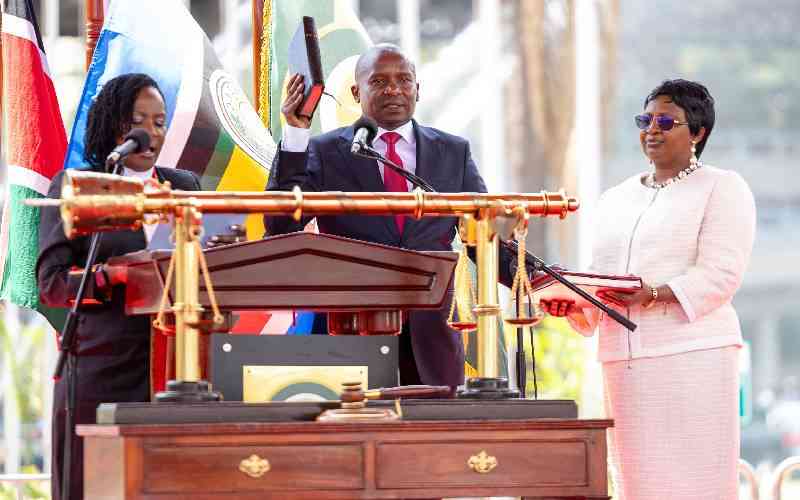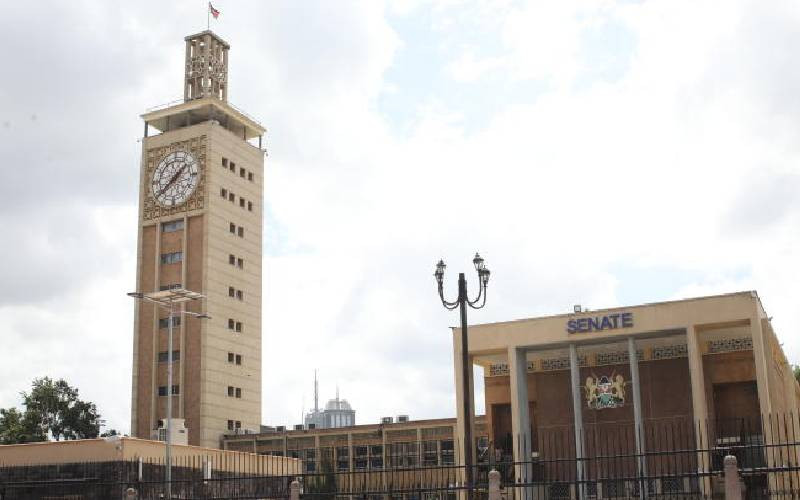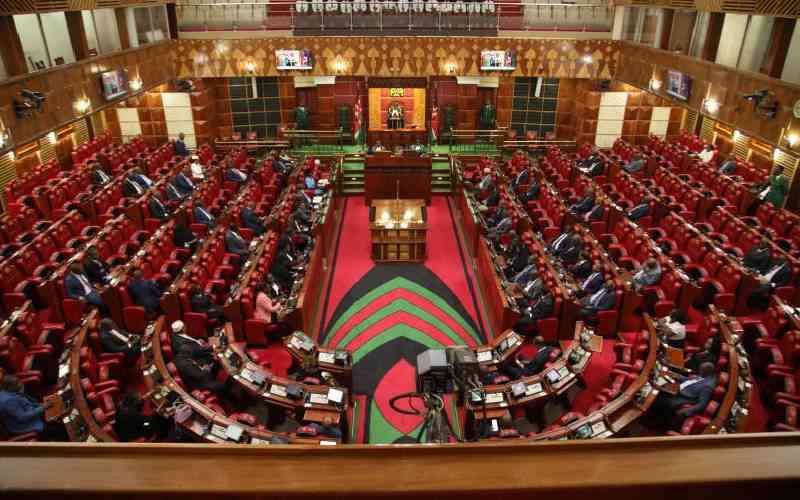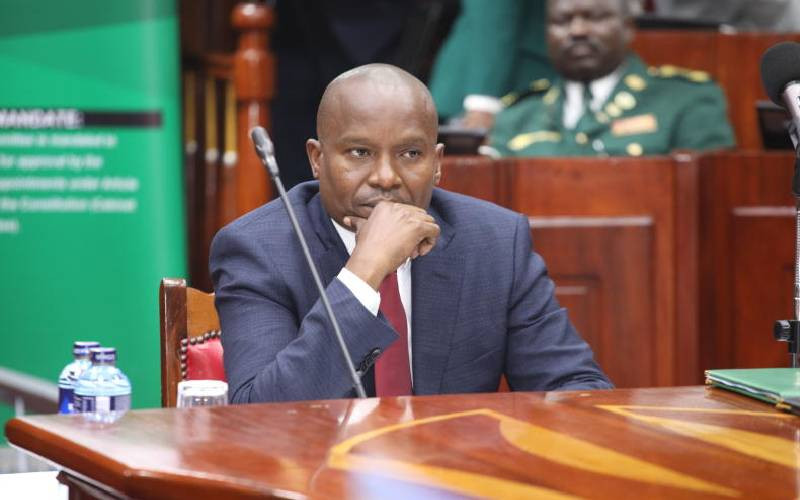By Jackson Okoth
Retail investors fleeing a volatile Nairobi Stock Exchange (NSE) where returns have been dwindling for months are gradually shifting attention to Government securities market as the next investment frontier.
This follows a well-crafted move by Central Bank of Kenya (CBK) to lower the minimum investment amounts in the much fancied Treasury Bills from Sh1 million to Sh100,000. While Treasury is seeking to net cheaper money for budgetary financing from the domestic market, Central Bank could also be using this ploy to tame commercial bank players who have been exerting pressure on it to increase interest on Treasury Bills.
The opening up of the Treasury Bills market to more players has effectively enabled CBK to cut back on reliance on commercial banks — the main players in the Government’s securities market.
 |
Investors monitor proceedings at the Nairobi Stock Exchange (NSE) trading floor from the public gallery. CBK’s latest strategy, which targets ordinary investors is bound to put pressure on commercial banks to increase interest rates on savings and deposits. Photo: File |
"These short-term debt instruments will be attractive to retailers, especially those seeking safer havens from inflationary effects," says Mr Ocholla Odhiambo, a portfolio manager at Suntra Investment Bank.
Perhaps CBK’s idea to tap into the vast pool of cash controlled by retail investors has been informed by, among other factors, record oversubscriptions of past Initial Public Offers that appears to have taken aback the regulator. It has realised that there is a huge untapped potential to drive its debt instruments.
With the latest initiative, the monetary authority hopes to take advantage of the fact that various savings and deposit products offered by commercial banks remain unattractive to investors due to the low returns on offer and it could provide an ideal alternative by restructuring its Treasury Bill denominations to widen its net.
And with prevailing inflation rate at 27.7 per cent, the value of commercial bank deposits is being eroded, with investors recording negative returns on their savings.
While commercial banks offer an average of 1.70 per cent on savings, those investing in Treasury Bills and Bonds could pocket as much as eight to 13 per cent.
Performance
In these harsh economic times, commercial banks have continued to record impressive financial performance largely due to their high fee charges on deposits and the wide spread between lending and deposit rates.
Available figures from CBK indicate that while commercial banks offer a paltry 1.70 per cent rate on savings, lending rates are upwards of 14.06 per cent while the deposit rate for big bucks stood at 4.48 per cent.
CBK’s latest strategy that targets ordinary investors is bound to put pressure on commercial banks to increase savings and deposit rates if they have to retain hard cash within the banking circles. Until this latest move, trade in Government paper has been the preserve of commercial banks, insurance firms and other institutional investors and fund managers.
Stay informed. Subscribe to our newsletter
CBK monthly bulletins show that by October last year, commercial banks held Treasury Bills worth Sh44.2 billion, comprising 49.2 per cent of the entire T-Bill market.
During this period, insurance firms held 21.3 per cent (Sh19.1 billion), parastatals 5.3 per cent (Sh4.7 billion), building societies 0.8 per cent, pension funds 7.1 per cent, while retailers held Sh14.7 billion or 16.4 per cent of the market.
Bond market
Commercial banks are also major players in the bond market, holding Treasury Bonds worth Sh160.6 billion (51.0 per cent) by last October.
Treasury is moving into the low end of the money market at a time when it is under pressure to finance a growing budget deficit. The new approach is strategic and gives it an opportunity to raise the much-needed cash without upsetting interest rates and crowding out the private sector.
However, this spells doom to the banks and equity market, whose business solely rely on these low end investors.
The overall budget deficit this fiscal year, including grants, is projected at Sh127 billion.
The Government intends to finance this deficit through external borrowing of Sh25.2 billion, while it will be seeking Sh54.5 billion from the domestic market, including Sh18.8 billion in long-term domestic infrastructure bonds. It is also in the process of entering into a massive privatisation programme to raise some Sh8 billion from the sale of four sugar firms and its stake in various public corporations. Already, issuance of the Sh33.6 billion from sovereign bond to finance infrastructure development has been put in the back burners, piling pressure of Treasury to raise cash from the domestic market.
Pressure
While opening up of the Government securities market to small investors will pile pressure on interest rates to move downwards, experts say this approach could also delay recovery of the equity market.
Unlike the stock market, which is still reeling from declining returns and low investor confidence, one cannot go wrong on Government paper.
Presently, CBK is offering for sale one-year Treasury Bonds worth Sh5 billion. The minimum amount to be invested in this short-term instrument is Sh50,000, in an offer closing on January 21. With more players entering the T-Bill market, the over 4,000 active accounts held by the CBK’s central depository could go up significantly.
Attention to the Treasury Bill and Bond market is also taking place when CBK has reduced its cash ratio for commercial banks from six per cent to five.
It is anticipated that this will increase liquidity and availability of credit in the market.
CBK has also lowered its CBR rates from nine to eight per cent, indicating the Government policy objective of reducing interest rates in the prevailing tight liquidity condition in the financial system.
The anticipated improved liquidity is expected to shift focus on the more attractive Government paper.
Treasury Bills were first issued by CBK in 1969. The market has since undergone various changes.
Previously, Treasury Bills were sold in maturities of 28, 60, 91, 182 and 270 days with minimum amount required at Sh50,000.
This amount was raised to Sh1 million in 1997 with maturity range remaining 90 and 182 days. Investors wishing to participate in the Treasury Bills weekly auction process at CBK are required to quote a price or submit a non-competitive bid.
 The Standard Group Plc is a
multi-media organization with investments in media platforms spanning newspaper
print operations, television, radio broadcasting, digital and online services. The
Standard Group is recognized as a leading multi-media house in Kenya with a key
influence in matters of national and international interest.
The Standard Group Plc is a
multi-media organization with investments in media platforms spanning newspaper
print operations, television, radio broadcasting, digital and online services. The
Standard Group is recognized as a leading multi-media house in Kenya with a key
influence in matters of national and international interest.
 The Standard Group Plc is a
multi-media organization with investments in media platforms spanning newspaper
print operations, television, radio broadcasting, digital and online services. The
Standard Group is recognized as a leading multi-media house in Kenya with a key
influence in matters of national and international interest.
The Standard Group Plc is a
multi-media organization with investments in media platforms spanning newspaper
print operations, television, radio broadcasting, digital and online services. The
Standard Group is recognized as a leading multi-media house in Kenya with a key
influence in matters of national and international interest.









